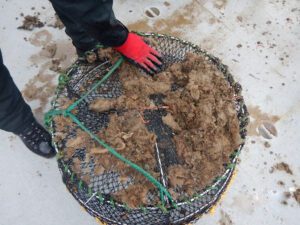
The master of the commercial prawn fishing vessel Darkstar has been sentenced following a long-running court case over illegal fishing in British Columbia’s Strait of Georgia, Canada’s Department of Fisheries and Oceans revealed Feb. 23.
Judge S.M. Merrick ordered the vessel master to pay a fine of $250,000 and forfeit all gear seized (with an approximate value of $80,000) after previously finding him guilty on May 24, 2023 of a total of 13 violations of Canada’s Fisheries Act.
On July 2 and July 3, 2020, Fisheries and Oceans Canada (DFO) Conservation and Protection fishery officers seized the vessel master’s prawn traps, which were illegally set in the Strait of Georgia Glass Sponge Reef Marine Refuges near Sechelt. This area is protected and closed to all prawn fishing due to the habitat’s highly sensitive nature.
A subsequent investigation revealed that the individual was also in violation of the conditions of his commercial license between July 2 and September 24, 2020. He was accused of hauling gear prior to 7 a.m.; failing to keep an accurate logbook or provide records in the required time, and having buoys that were in non-compliance with Fisheries Act regulations.
Commercial prawning setting and hauling of prawn and shrimp gear is permitted only between 7 a.m. and 7 p.m.
The vessel master, whose name was not provided by DFO, pled guilty to seven of the 13 violations and the court declared him guilty of the other six. The trial commenced April 25, 2022, and continued for 14 days until a guilty verdict was handed down May 24, 2023. It concluded with the sentencing on Jan. 31, 2024.
During the sentencing hearing, a member of the shíshálh Nation read an impact statement outlining the Nation’s concerns about illegal fishing in the Glass Sponge Reef, which is a globally unique marine refuge.
Additional testimony was given by DFO expert Dr. Anya Dunham, who gave scientific evidence of the harm caused by illegal fishing activity within the protected area.
British Columbia’s ancient glass sponge reefs are a unique ecosystem with areas of high biodiversity that provide important habitat for many marine animals, including spot prawns, rockfish, herring, halibut and sharks.
Glass sponges live in deep water and are slow to reproduce, with skeletons made of nearly pure glass (silica). They’re extremely fragile and easily damaged by any human disturbance.
